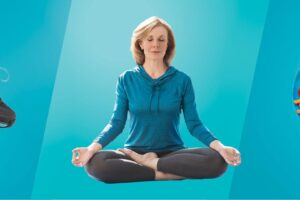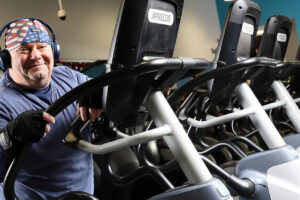When Linda Kantor felt stomach discomfort last Valentine’s Day, she assumed it was indigestion from a heavy celebratory dinner and took some antacids. But the feeling persisted the next day with some pain in her arm, so she called her son-in-law, who advised her to go to an urgent care center.
There, an electrocardiogram was performed, which was abnormal. She was referred to CentraState’s Emergency Department for further evaluation.
“I was in denial,” Linda says. “I know that women manifest the symptoms of a heart attack differently than men, but I kept insisting it was indigestion.”
Linda, 77, of Monroe Township, had no prior history of heart issues. She lived an active lifestyle and enjoyed skiing, dancing, and golfing. In hindsight, however, she recalls feeling increasingly tired before the heart attack and was eating a keto diet heavy in fat.
While in the ER, several of Linda’s tests came back with abnormal values, including her cardiac enzymes. She was admitted to CentraState by board-certified cardiologist John Werber, MD, and a cardiac catheterization revealed that she had severe cardiac vessel disease.
Making Heart-Healthy Changes
After having a five-vessel cardiac bypass surgery, Linda followed up with board-certified cardiologist Ashish Awasthi, MD, Dr. Werber’s partner. He recommended that she start cardiac rehabilitation at CentraState to better understand the lifestyle changes she’d need to make and how to start exercising again safely. The program was recently recertified by the American Association of Cardiovascular and Pulmonary Rehabilitation for the fifth consecutive time, a recognition of its high-quality care.
“Cardiac rehab helps participants focus on taking care of themselves,” Dr. Awasthi explains. “It builds confidence and creates a support system with others who’ve had similar experiences.”
The three-phase program includes education about risk factors, nutrition, and medications, as well as a monitored exercise program. During rehab, Linda worked out several times a week using a treadmill, recumbent bike, weight machines, and free weights.
“I’ve always been someone who enjoys exercise, so I loved it,” says Linda, who wrapped up rehab in September.
Because open-heart surgery is life-changing, Linda will need to continue to get regular blood tests, take medication, eat healthfully, and exercise regularly.
“You have to redefine yourself after something like this,” says Linda, who is easing back into golfing and bought an adult tricycle to get additional exercise. “I’m learning to take better care of myself. I’m thankful for the support I received at CentraState.”
For more information about cardiac rehabilitation services at CentraState, visit centrastate.com/cardiacrehab or call 866-CENTRA7 (866-236-8727).





